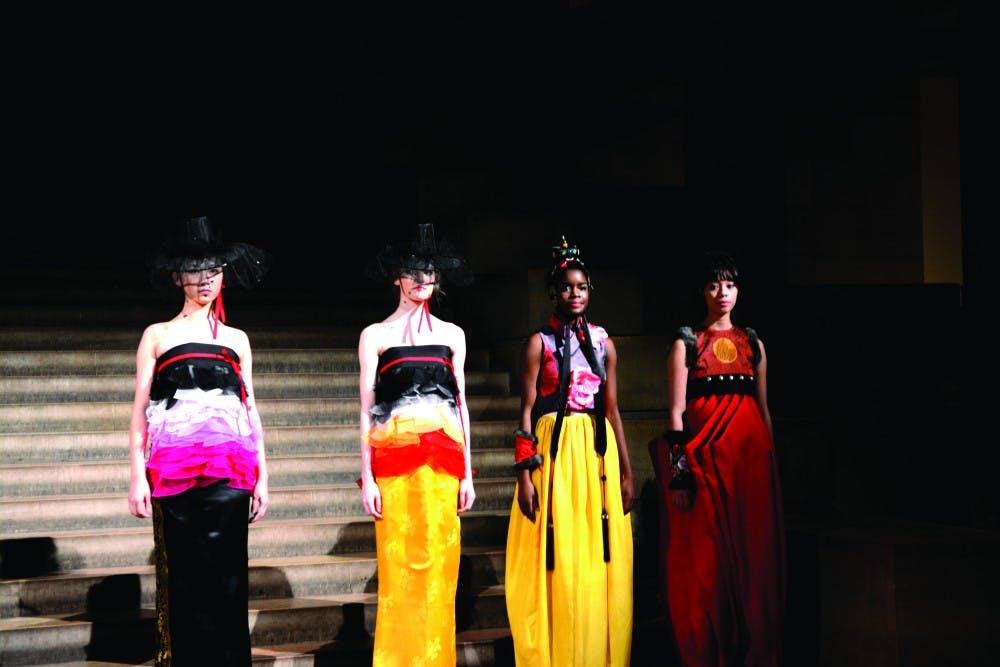When Won Lee, the creative director of the Hyesoon Kim Hanbok show, wanted to recruit models for his fashion show event which showcased traditional Korean dresses at the Philadelphia Museum of Art, Penn students came to mind.
He reached out to the student club Liberty in North Korea to spread the word . Within two and a half weeks , about 52 Penn students applied and 15 of them got in, which constitutes 40 percent of his model population.
“We took people who had experience in modeling or [were] very interested in modeling, or proud of their body appearance ... [and those] who have been interested in Korean culture,” he said. “Most of the students are from Wharton.”
Penn students’ involvement in fashion is increasing both on and off the campus. The WALK Magazine and Penn Fashion Week are some of the most well-known fashion initiatives on campus.
However, many of the students who take part in fashion-related events on campus do not plan to extend their extracurriculars into a career.
“This might be my only chance to do something like this. I think still being a student is great, because you get all these benefits, doing things you like without having to make a career out of it,” Meicen Sun, a first-year Ph.D. student in political science and a model for the Wharton Charity Show said.
“ I took it as a good study break. It’s just nothing like I am used to do[ing],” she added.
Andrea Shen , a Wharton sophomore and a part-time model who participated in professional runway shows in Chicago and Penn Fashion Week, also says modeling is a personal interest, not a career choice. She said, “Fashion model[ing] is not easy. It requires a lot of commitment to make a career out of it. You have to put a lot of time and effort and energy into it. ”
Over the summer she worked on a few modeling projects and interned in retail but does not plan to work in fashion after graduation.
Max Wang, a college junior and the Editor-in-Chief of The Walk Magazine, a student-run fashion magazine, plans to go to Medical school, but is very interested in fashion. “You can pursue a professional degree, [with fashion ] supplementing your education.”
Nevertheless, Barbara Kahn, the director of the Jay H. Baker Retailing Center at Wharton and a Professor of Marketing, said the school has seen an increasing number of students entering into the retail and fashion industries .
“When Jay Baker first gave the money [10 years ago], nobody went into retailing,” she said . In 2003, there were two undergraduates who worked in retail as either full-time or internship. In 2004-2005, the number increased to 43. In 2012 and 2013, 75 undergraduates worked in retail.
“While the secondary concentration Retailing does not attract a large number of students, retail-related courses are usually full,” Kahn said. The school offers various resources to students who are interested in fashion.
For example, Wharton International Program brought students to visit fashion centers in the world. “In London we saw Burberry. In Paris we saw Hermes. In Milan we saw Versace, Ralph Lauren and Gucci,” Kahn said.
When asked if there might be a fashion minor, as proposed by students in December 2012, she said, “It’s possible. [It] has to go through a curriculum committee and get sponsors.” Currently, the Wharton school offers a secondary concentration in Retailing, where students can take courses on retail supply chain and retail merchandising.
Similarly, Wharton students have produced more fashion startups in recent years. Warby Parker Eyewear, founded by Neil Blumenthal, David Gilboa, Andrew Hunt and Jeffrey Raider, all 2010 Wharton MBA graduates founded the company in 2010. Wharton MBA graduates Dorie Golkin and Emelyn Northway started the ladies’ business wear startup Of Mercer in 2013.
Stephanie Mou , a second year MBA student and founder of Prince & Baron a fashion startup in Philadelphia selling customized male business suits, decided to enter the fashion industry while at Wharton.
“I knew I wanted to do entrepreneurship, but not sure which industry.” She said, “For me the fashion industry is very intuitive, visual and very tangible. You can have a true sense of what products you are delivering and how happy your customers [are]. ”
Mou encouraged students to experiment with various disciplines like fashion while at Penn. “Because you are still at school, you should really explore as much as you can in terms of your interests, and what you can derive from there and make an impact,” she said. “School is really a risk-free environment...even if you fail, you are still at school and you can still find a job.”
She commented that although the Wharton school does not have a huge presence in the fashion industry yet, she has seen more and more Wharton students entering the retail and fashion industry.
“You have to have some pioneers who get into some industries and then help others. Probably in the next five years we will have more connection[s] in [fashion industry] and bigger exposure.”
The Daily Pennsylvanian is an independent, student-run newspaper. Please consider making a donation to support the coverage that shapes the University. Your generosity ensures a future of strong journalism at Penn.
DonatePlease note All comments are eligible for publication in The Daily Pennsylvanian.








